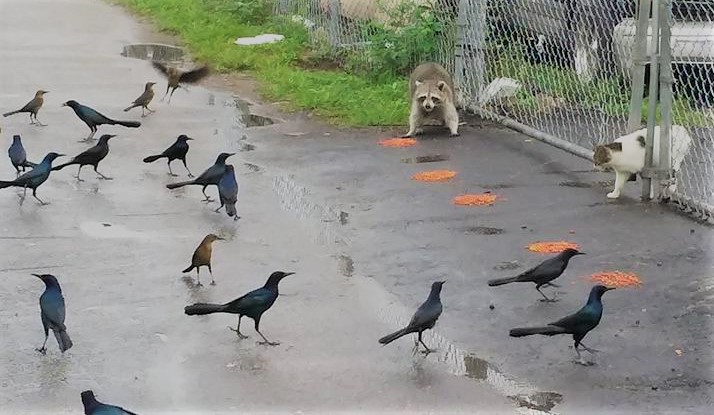As a cat owner with a cat that likes to hunt, there is a good chance that your pet will bring home a bird or two from time to time. While the hunter and the catch seem interesting, you should be worried about the dangers that come with birds when a cat hunts, eats, and brings it home. This piece will expose you to what happens when cats eat birds and how to prevent associated problems.
Cats are obligate carnivores, meaning that they need to eat meat in order to survive. Their digestive system isn’t built for a vegetarian diet and they aren’t able to get all the nutrients they need without eating meat, the taurine factor. Cats are highly skilled and stealthy predators; they chase and pounce on prey like rats and birds in the wild and neighborhood.

Dangers of Cats Eating Birds
Birds can be difficult prey for cats to hunt and kill, but once caught, cats are perfectly capable of devouring them. Birds are an excellent source of protein for your cat. While eating a bird may not be dangerous for your cat, it is not recommended as a regular part of their diet. The best way to keep your cat healthy is to provide them with a balanced diet.
Cats who eat birds may get sick as a result of gastric upset and can be infected with various diseases that can be transmissible to humans when they come in contact. The danger is If your cat eats a bird that has been infected or a carrier of disease like Salmonellosis or parasites like tapeworms, the cat will be exposed to large numbers of bacteria and parasites that can impair the health if the cat and the innocent owners.
If you are sure your cat eat a bird and it is vomiting and seems lethargic and groaning in pain, it may be due to more severe damage to the stomach or if the bird was ill and may have passed infectious disease or parasites to your cat. It is safe to avoid contact with the cat till is it is treated and becomes active again.
One of the diseases birds carry and can be transferred to cats when they kill and eat birds is Salmonellosis, it is a very dangerous disease that can harm cats. Salmonellosis is an infection with a bacteria called Salmonella. The bacteria live in the intestinal tracts of birds, reptiles, and other animals. The signs you will observe when your cat has salmonella are:
- Diarrhea
- Vomiting
- Weight loss (anorexia)
- Lethargy/weakness/malaise
- Bloody stool
- High temperature
- Dehydration
What To Do If My Cat Catches a Bird
If your cat catches a bird in your presence and the bird is alive, try to distract your cat with their favorite treats or toys so that it can release the bird. Calmly take the bird out of the sight of your cats. And if your cat runs with the bird, do not chase after your cat as chasing it will likely make it frightened. However, if your cat has caught a bird and is eating it, offer some tasty treats to lure them away from the bird. Isolate your cat and monitor your cat for any signs of illness after eating the bird.
While your cat may eat a bird with no ill effects, it is best to discourage this behavior for several reasons:
- The bird may be carrying a disease that could make your cat unwell.
- Eating a bird may irritate or damage the cat’s stomach.
- Cats are a major reason for the reduction in garden bird populations, and chasing and killing birds should be prevented where possible.
It may be very difficult to stop active cats from hunting; at the same time, you want to be sure your cat is healthy and free from parasites and diseases. What you can do in this case is to ensure your cats are up to date on vaccines for disease and parasite prevention. Occasionally give your cat antibiotics, dewormer, and supplements to boost their immune system against diseases and parasites.
In addition, give your cats quality food and fresh water to discourage them from hunting. Training your cats to eat and drink from pet feeders and drinkers can reduce their desire to hunt for food. Also, engaging your cats with decided cat toys can completely help them wade off their natural instinct of hunting.
Can Cats And Humans Catch Diseases From Birds?
If your cat experiences continued or frequent symptoms such as vomiting, losing weight, or fever, take it to the vet; otherwise, it is likely fine. If you want to stop your cat from killing birds, keep it inside or fit a special anti-hunting collar on it.
Cats are liable to catch diseases and parasites from catching wild birds or infected domestic birds. Birds can carry diseases such as salmonella, bird flu, and Chlamydophila. These diseases can affect cats and even people. As such, a cat could catch those diseases from a bird and then pass them on to their owner.
When your cat is sick from an unsuspected illness, avoid having direct contact with the cat; always wear bite-proof gloves when handling such cats, and wash your hands thoroughly afterward. Contact your vet and relate the signs and past events of the cat for proper diagnosis and treatment.
Lastly, hunting vulnerable prey is part of the innate activities of cats. As a responsible owner, you can control the extent of hunting and what your cats hunt. Giving cat treats can modify their characters into a sociable one. Also, allowing your cat access to toys and playgrounds can help reduce their wildness and slowly eliminate the habit of hunting. Remember to give your cat up-to-date vaccines, supplements, and dewormers to prevent diseases and improve their health and wellness.